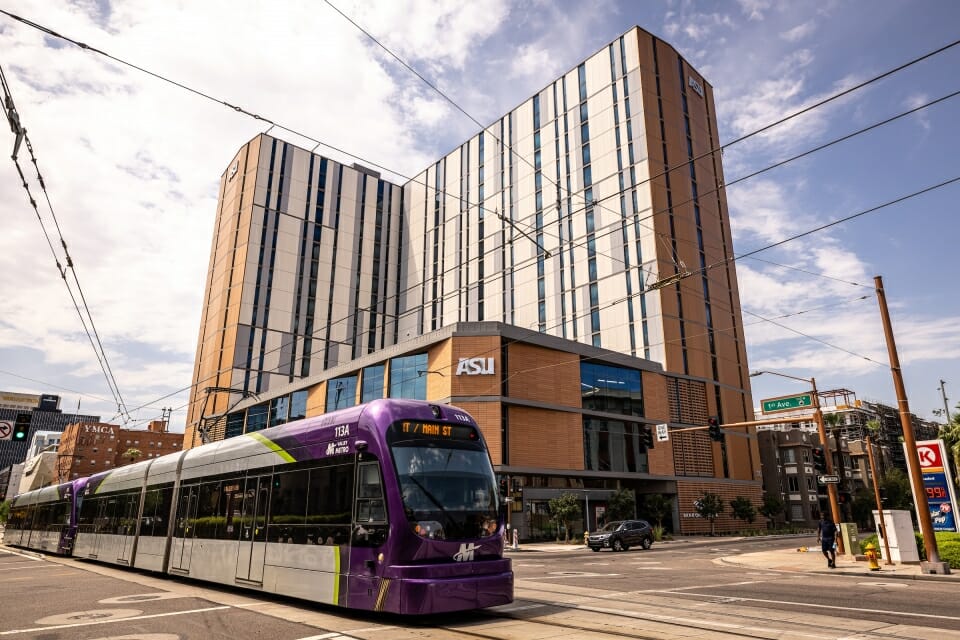Arizona State University released its annual Clery Act report on campus safety which showed an 11% decrease in crime rate and arrests across the ASU downtown Phoenix campus in 2020.
The report showed that the centrally-located campus ranks second for criminal activity across ASU’s four Metro Phoenix campuses, However, it did show a significant decline in almost all non-alcoholic and non-drug-related crimes reported.
READ ALSO: Here’s how ASU Downtown Phoenix has transformed the city
The Clery Act is a federal law that aims to provide transparency surrounding college and university sexual assault, crime policy and statistics in order to protect victims of crime and those that are accused. The university distributes a notice of the availability of the Security and Fire Safety Report each year to every member of the sun devil community.
“We do our best to make sure the campus is as safe as possible,” said ASU officer Nathan Toth. “We have the security cameras on campus, emergency call boxes and the LiveSafe app that we use as tools to keep everyone safe.”
The Clery Act data included various types of crimes occurring across all ASU campuses, residential halls, relevant non-campus property as well as public property. The report compared crimes that took place in the past three years. It showed overall reported illegal activity decreased from nearly 1,651 in 2019 to 1,462 total crimes in 2020.
The number of dating violence incidents and rape cases dropped by 50%, aggravated assaults declined by 33%, and robberies decreased by 100%. This included events of the past year in which protests and vandalism occurred in downtown Phoenix. There were no reported hate crimes in 2020 on the ASU campuses, which was a relief to many nearby dorm residents.
“I think the university definitely takes into account the area of the campus and that’s why they do extra security,” said Dailyn Morales, a resident of Taylor Place. “If any guest tries to come into the university’s dorm, staff ensure they check in with security in the lobby and provide identification. My sister lives in the ASU West campus dorms and the security checks are not as thorough as they are here downtown.”
Toth said that the slow but overall recent success in campus safety can be attributed to early reporting and the prompt cooperation of victims during investigations as well as the use of on-campus technology.
Emergency call boxes located throughout the campuses have also proved to be quite effective in keeping students safe as police dispatchers are ready to assist if need arises in an unsafe situation. The LiveSafe app is another tool which allows for anonymous reporting and uses the phone’s GPS to locate a user’s progress on a web-based map. It allows users to communicate with ASU Police in real-time via audio, pictures, text and video. The app already has a 3.0 of 5 stars rating and 3 out of every 10 students has downloaded it on the App Store, Google Play and ASU Police website.
According to the Clery Act report, “The ASU LiveSafe app is an additional step ASU takes to improve the safety of the living, working, and studying environment that the university community enjoys.”
Several tools are available for students on all ASU campuses to combat crime and keep the community safe and informed. If students wish to report a crime, whether as a victim or witness, they may contact the ASU Police Department at 480-965-3456 or use the ASU LiveSafe mobile app. The ASU Victim Advocates number is 480-965-0107 and the community crime map in Phoenix can be viewed at https://communitycrimemap.com/.
“The ASU Police is a full-service department operating 24 hours a day, 365 days a year, using a community-oriented policing model,” said Michael L. Thompson, chief of police. “We recognize the importance our department plays in promoting an environment that enhances trust within the ASU community through communication, listening, respect, transparency, and procedural justice, which are the pillars of our department and critical to everyone’s success.”




